|
|
|
Sort Order |
|
|
|
Items / Page
|
|
|
|
|
|
|
| Srl | Item |
| 1 |
ID:
107947
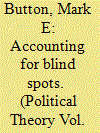

|
|
|
|
|
| Publication |
2011.
|
| Summary/Abstract |
This essay is concerned with the challenges that moral "blind spots" create for the presence and endurance of democratic virtues under conditions of pluralism. A moral blind spot refers to the occlusions in individual moral perceptions and the limits that circumscribe moral sympathies owing to our ineluctable partialities as socially embedded beings. Blind spots constitute a tragic feature of human perception and moral judgment that facilitate and undermine human agency at once. Yet, far more problematic from the perspective of democratic epistemology and normative ethics is the denial or willful forgetfulness of their place in our individual and collective lives, and the concomitant failure to account for moral blind spots so as to check their most pernicious effects. Accounting for moral blind spots in practice requires actively planning for their presence through the cultivation of the "pathos of distance" towards ourselves and our collective political identities and social institutions.
|
|
|
|
|
|
|
|
|
|
|
|
|
|
|
|
| 2 |
ID:
045887


|
|
|
|
|
| Publication |
New York, Academic Press, 1969.
|
| Description |
XIII, 400 p.
|
|
|
|
|
|
|
|
|
|
|
|
Copies: C:1/I:0,R:0,Q:0
Circulation
| Accession# | Call# | Current Location | Status | Policy | Location |
| 004061 | 302/ROS 004061 | Main | On Shelf | General | |
|
|
|
|
| 3 |
ID:
024715


|
|
|
|
|
| Publication |
New York, Van Nostrand Reinheld Company, 1970.
|
| Description |
321p.
|
| Series |
Sociological concepts, methods, and data series
|
|
|
|
|
|
|
|
|
|
|
|
Copies: C:1/I:0,R:0,Q:0
Circulation
| Accession# | Call# | Current Location | Status | Policy | Location |
| 004384 | 302/TAY 004384 | Main | On Shelf | General | |
|
|
|
|
| 4 |
ID:
049833
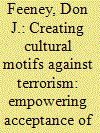

|
|
|
|
|
| Publication |
Westport, Praeger Publishers, 2003.
|
| Description |
xvi, 178p.
|
| Standard Number |
0275979202
|
|
|
|
|
|
|
|
|
|
|
|
Copies: C:1/I:0,R:0,Q:0
Circulation
| Accession# | Call# | Current Location | Status | Policy | Location |
| 047348 | 302/FEE 047348 | Main | On Shelf | General | |
|
|
|
|
| 5 |
ID:
037505
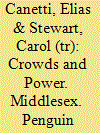

|
|
|
|
|
| Publication |
Middlesex, Penguin Books, 1960.
|
| Description |
575p.
|
|
|
|
|
|
|
|
|
|
|
|
Copies: C:1/I:0,R:0,Q:0
Circulation
| Accession# | Call# | Current Location | Status | Policy | Location |
| 021733 | 305/CAN 021733 | Main | On Shelf | General | |
|
|
|
|
| 6 |
ID:
121057
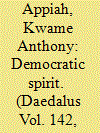

|
|
|
|
|
| Publication |
2013.
|
| Summary/Abstract |
There is a famous paradox about democracy: most forms of participation make no obvious difference to political outcomes and yet people act anyway. I argue that they are more likely to act politically if they have certain attitudes and commitments; and that productive attitudes of the right kind can be sustained by a culture in which two kinds of honor are central. One kind of honor is collective: it is the honor of nations, which is the concern of the patriot. Another is the honor of citizens, who are worthy of respect because they contribute to the practices that serve the republic. I suggest some practices we Americans might want to take up and honor for the sake of our own republic today, drawing attention to two discoveries in social psychology that could be productively brought to bear in our political life: namely, the Ben Franklin effect and the Contact Hypothesis.
|
|
|
|
|
|
|
|
|
|
|
|
|
|
|
|
| 7 |
ID:
165781
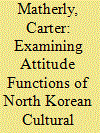

|
|
|
|
|
| Summary/Abstract |
Article Type: Research Paper Purpose—Functions of attitudes serve a critical role in the development of individual motivation and behavior. Attitudinal preferences can be manipulated through an idealized representation, such as a poster. The purpose of this research is to examine an example of North Korean cultural propaganda for symbolism intended to influence an observer's attitudes. Design, Methodology—A single poster with a plethora of symbolic representation was qualitatively examined through a psychological lens of attitude functions. Findings—The examination showed stark images and symbolism paint a compelling picture full of value-driven and defining notions in which each act to inform the observer's perceptions of their own selves. Attributes of the social identity of an ideal citizen through multiple life stages was derived. Practical Implications—Useful for policymakers and academics by offering insight into the social structure and symbolic importance that underpins North Korea. It also informs scholars on applied methods used by a government to shape a nation's cultural identity. Originality, Value—This is one of few articles to further propaganda research of North Korea. It may be the only article to apply a psychological lens of attitude functions to examine the said propaganda.
|
|
|
|
|
|
|
|
|
|
|
|
|
|
|
|
| 8 |
ID:
030826


|
|
|
|
|
| Publication |
Oxford, Basil Blackwell, 1972.
|
| Description |
vi, 327p.
|
| Series |
Littlefield, Adams quality paperback; no. 269
|
| Standard Number |
0631142207
|
|
|
|
|
|
|
|
|
|
|
|
Copies: C:1/I:0,R:0,Q:0
Circulation
| Accession# | Call# | Current Location | Status | Policy | Location |
| 010521 | 302/HAR 010521 | Main | On Shelf | General | |
|
|
|
|
| 9 |
ID:
167665
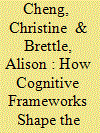

|
|
|
|
|
| Summary/Abstract |
Why do American perspectives of international relations (IR) continue to hold sway over an increasingly diverse discipline? What actually constitutes “Americanness” in IR? Who is considered “American” in IR? These are the central questions we explore in this essay. Drawing on cognitive and behavioral insights from social psychology, we argue that there is a distinct “American approach” to international relations and security studies and that this approach is a product of Western cognitive frames. We identify three factors that represent the American approach's hyper-Westernized framing: individualism, equality, and a preference for causal rather than contextual analysis, and a preference for egalitarianism. We argue that these are reinforced by two social identity processes—academic identity and national identity. The consequences of “being American” in IR and security studies suggest not only problems of attention and accuracy, but an inherent failure to appreciate that Western—and particularly, American—ways of seeing and valuing the world are not universal.
|
|
|
|
|
|
|
|
|
|
|
|
|
|
|
|
| 10 |
ID:
144678


|
|
|
|
|
| Summary/Abstract |
Israel and the Islamic Republic of Iran have had a problematic relationship for the last four decades. Despite their tense relations, Israel is home to thousands of Persians and Iran has the second largest Jewish population in the Middle East. There are social, political and psychological obstacles to dual identification. Using qualitative thematic analysis and Identity Process Theory, this article examines the construction and management of Persian/Iranian and Jewish/Israeli identities among these groups. The following themes are discussed: (1) the challenges and maintenance of dual identification, (2) breaking down boundaries between identities, and (3) Persian-Iranian or Jewish-Israeli? Establishing coherence in identity. Results suggest that, while the social and political institutions in Iran and Israel construct barriers to dual identification, individuals deploy creative strategies for constructing an ethnic identity that acknowledges both components of their heritage. The implications for self-identity are discussed.
|
|
|
|
|
|
|
|
|
|
|
|
|
|
|
|
| 11 |
ID:
129470
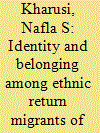

|
|
|
|
|
| Publication |
2013.
|
| Summary/Abstract |
This article explores the nature, construction, and negotiation of identity among Oman's ethnic return migrants called Zinjibaris. Using a social psychological approach, in which ethnic identity is conceptualized as fluid and socially constructed, the study examines how these migrants first define their identity in Zanzibar and then redefine it and forge a sense of belonging on returning to their ancestral homeland. The life stories of four women, representing three generations of returnees, highlight the role played by sociohistorical narratives and Arab descent ideology in constructing a multihyphenated identity-Zinjibari-Omani and Arab-Omani. They also reveal the implications of such an identity positioning for processes of inclusion and differentiation.
|
|
|
|
|
|
|
|
|
|
|
|
|
|
|
|
| 12 |
ID:
164818
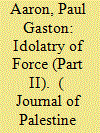

|
|
|
|
|
| Summary/Abstract |
Building on “The Idolatry of Force: How Israel Embraced Targeted Killing,” published in the Autumn 2017 issue of the Journal of Palestine Studies, this companion piece examines the practices through which Israel's garrison state normalizes aggressive militarism and indifference to the pain of others. Political discourse and semantics, media, pedagogical instruction, religious training, and the shared experience of army service all feed into a warrior code and culture where combat and preparations for combat become second nature, and where violence, no matter how extreme and disproportionate, assumes collective legitimacy. A broad rhetorical repertoire is deployed to craft a narrative of virtue, sacrifice, and necessity. Key to this narrative are the threat to national survival posed by demonic enemies and the spiritual valor embodied and replenished in the struggle to vanquish them.
|
|
|
|
|
|
|
|
|
|
|
|
|
|
|
|
| 13 |
ID:
123993
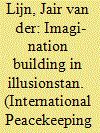

|
|
|
|
|
| Publication |
2013.
|
| Summary/Abstract |
A variety of international actors, such as the UN and NATO, intervene in complex environments, such as Afghanistan. In order to overcome complexity and for 'us' to deal with 'them', constructs such as 'the insurgents' and 'the government' are used to help 'our' understanding and to simplify the picture. Subsequently, these constructs become subject to nation building and counterinsurgency theories applied by the 'international community'. Many of these are suboptimal because their subjects were constructs in the first place. The result is a shadow boxing match, in which international policies dissolve in local realities. On the basis of social psychology theories, this paper develops the hypothesis that in complex peacebuilding environments decision-makers structure and simplify disorder, which leads to suboptimal interventions, to which local actors respond in a process of friction. This hypothesis is tested on the case of Afghanistan.
|
|
|
|
|
|
|
|
|
|
|
|
|
|
|
|
| 14 |
ID:
030776


|
|
|
|
|
| Publication |
New York, Wiley-Interscience, 1971.
|
| Description |
xii, 153p
|
| Series |
Comparative studies in behavioral science: a Wiley series
|
|
|
|
|
|
|
|
|
|
|
|
Copies: C:1/I:0,R:0,Q:0
Circulation
| Accession# | Call# | Current Location | Status | Policy | Location |
| 005037 | 302/PRZ 005037 | Main | On Shelf | General | |
|
|
|
|
| 15 |
ID:
186594
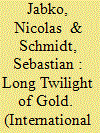

|
|
|
|
|
| Summary/Abstract |
Why has gold persisted as a significant reserve asset despite momentous changes in international monetary relations since the collapse of the classical gold standard? IPE theories have little to say about this question. Conventional accounts of international monetary relations depict a succession of discrete monetary regimes characterized by specific power structures or dominant ideas. To explain the continuous importance of gold, we draw on insights from social psychology and new materialist theories. We argue that international monetary relations should be understood as a complex assemblage of material artifacts, institutions, ideas, and practices. For much of its history, this assemblage revolved around the pivotal practice of referencing money to gold. The centrality of gold as experienced by policymakers had important effects. Using archival and other evidence, we document these effects from the 1944 Bretton Woods conference through the transition to floating exchange rates in the mid-1970s; most IPE scholars underestimate the role of gold during this period. Power relations and economic ideas were obviously important, but they contributed little to a fundamental development: the long process of reluctantly coming to terms with the limitations of specie-backed currency, and the progressive and still ongoing decentering of gold in international monetary relations.
|
|
|
|
|
|
|
|
|
|
|
|
|
|
|
|
| 16 |
ID:
098225


|
|
|
| 17 |
ID:
144674
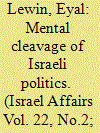

|
|
|
|
|
| Summary/Abstract |
In societies marked by numerous diversities, like the Jewish-Israeli one, understanding social cleavages might show a larger picture of the group and form a broader comprehension of its characteristics. Most studies concentrate on somewhat conventional cleavages, such as the socioeconomic cleavage, the ethnic cleavage, the religious or the political one; this article, by contrast, suggests a different point of view for the mapping of social cleavages within Israeli society. It claims that the Jewish population in Israel is split into two competing groups: stakeholders versus deprived. These categories of social identity are psychological states of mind in which no matter how the national resources are distributed, the stakeholders will always act as superiors, even if they are in inferior positions, while the deprived will always take the role of eternal underdog even if all of the major political ranks come under their control. This article brings about a review of over a century of ideological debates within the Zionist movement; it reveals how understanding the logic of the Israeli political discourse as a competition between the two newly defined social groups enables a better comprehension of the inherent tension between them.
|
|
|
|
|
|
|
|
|
|
|
|
|
|
|
|
| 18 |
ID:
097073


|
|
|
| 19 |
ID:
090795
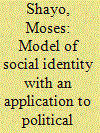

|
|
|
|
|
| Publication |
2009.
|
| Summary/Abstract |
This article develops a model for analyzing social identity and applies it to the political economy of income redistribution, focusing on class and national identities. The model attempts to distill major findings in social psychology into a parsimonious statement of what it means to identify with a group and what factors determine the groups with whom people identify. It then proposes an equilibrium concept where both identities and behavior are endogenously determined. Applying this model to redistribution helps explain three empirical patterns in modern democracies. First, national identification is more common among the poor than among the rich. Second, national identification tends to reduce support for redistribution. Third, across democracies there is a strong negative relationship between the prevalence of national identification and the level of redistribution. The model further points to national eminence, national threats, and diversity within the lower class as factors that can reduce redistribution.
|
|
|
|
|
|
|
|
|
|
|
|
|
|
|
|
| 20 |
ID:
096206


|
|
|
|
|
| Publication |
2010.
|
| Summary/Abstract |
Why are differences so political significant? Too often political science discussions of differences assume they are immutable. The attendant implication is that the political divisions attached to these variations-in religion, ethnicity, race, or any of the other dissimilarities that frequently enter political life-are considered rigid and inflexible. This commentary draws on recent work in moral and social psychology and evolutionary biology to suggest that the critical political factor surrounding differences is not their immutability but rather the moral and political salience we accord such differences. Simple experiments in social identity theory-and a conversation with an incensed 12-year old-demonstrate that the psychological process by which differences between people and groups become deemed ethically and politically relevant is totally socially constructed and hence can be restructured in a fashion that leads to more tolerant treatment of those judged different.
|
|
|
|
|
|
|
|
|
|
|
|
|
|
|
|
|
|
|
|
|